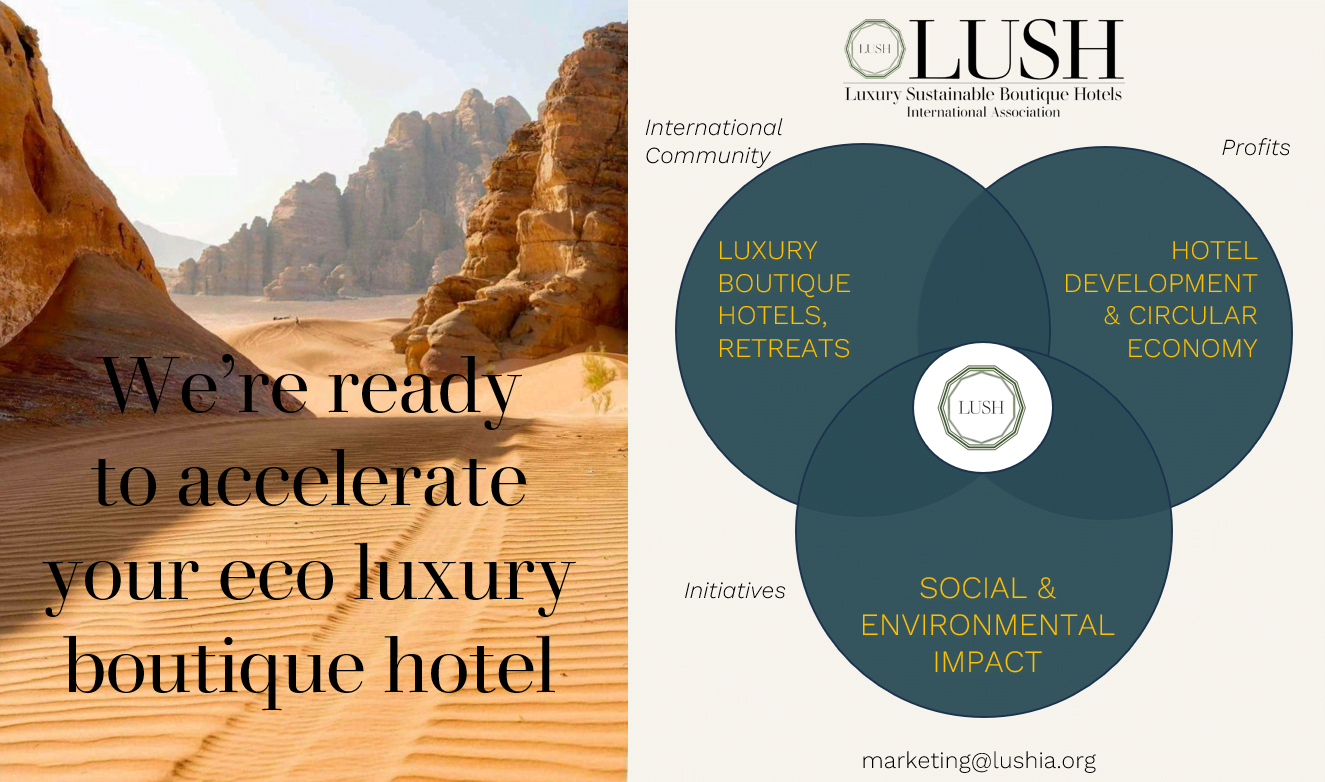As we step into 2024 and the recent celebration of FITUR Madrid, it is clear that the luxury sustainable hospitality sector is poised for transformative changes, blending innovation, environmental consciousness, and guest-centric experiences. Drawing insights from industry leaders, this article summarizes key points and explores the trends that will define the landscape of luxury sustainable hospitality in the coming year.


1. AI Revolutionizing Efficiency
Renowned information systems expert highlight the transformative power of AI in enhancing operational efficiency. AI provides unprecedented opportunities for hotels to enhance operational efficiency, from energy management to waste reduction, leading to substantial cost savings and environmental benefits.
This aligns seamlessly with the ethos of LUSH, the Luxury Sustainable Boutique Hotels Association, promoting sustainable practices in luxury accommodations.
2. Blockchain for Transparency
The integration of blockchain for transparency and traceability. Blockchain technology can validate sustainable practices, offering complete visibility into a hotel’s sustainability efforts, from sourcing materials to waste management. This ensures hotels uphold their commitments to eco-friendly initiatives, fostering trust among environmentally conscious guests.

3. Culinary Experiences Aligned with Sustainability
AI enables hotels to create personalized itineraries and recommendations for guests interested in eco-friendly activities, ensuring a more sustainable and enjoyable stay. Expectations for locally sourced, organic, and ethically produced ingredients will be met, offering unique gastronomic offerings.
4. Eco-Friendly Architecture and Design – A Vision for Sustainable Construction
Sustainability extends beyond operations, encompassing architectural and design elements. Hotels will prioritize eco-friendly materials and green building practices. This aligns with the commitment to certifications such as LEED, showcasing the industry’s dedication to sustainable construction practices.
5. Collaborations and Industry Alliances – The Role of LUSH association and other institutios
Collaborations will play a pivotal role, with industry alliances such as the LUSH fostering collective efforts. The association will keep on serving as a platform for sharing best practices, addressing common challenges, helping young talent, and promoting the adoption of eco-friendly initiatives across luxury sustainable hotels.
6. Guest Education and Participation
Guests will actively participate in the sustainability journey of luxury hotels. Through educational programs and immersive experiences, hotels will deepen guest understanding of sustainable practices. This aligns with the experiential learning philosophy advocated by the LUSH, enhancing guest engagement and fostering a shared commitment to responsible tourism.
7. Regenerative Tourism Initiatives – Making a Positive Impact
The concept of regenerative tourism will gain prominence, emphasizing active contributions to the restoration and enhancement of local ecosystems. Luxury hotels, inspired by the principles of regenerative tourism, will engage in initiatives such as reforestation projects, wildlife conservation efforts, and support for local social enterprises.

Conclusion
In conclusion, 2024 promises a groundbreaking era for luxury sustainable hospitality, where technological advancements, environmental responsibility, and guest-centric experiences converge. As we navigate this visionary path, luxury sustainable hotels will not only provide unparalleled experiences for guests but also serve as beacons of responsible and ethical tourism. The forecasted trends showcase a harmonious integration of innovation and sustainability, setting the stage for a new era where luxury and environmental consciousness seamlessly coexist.
__________________________



